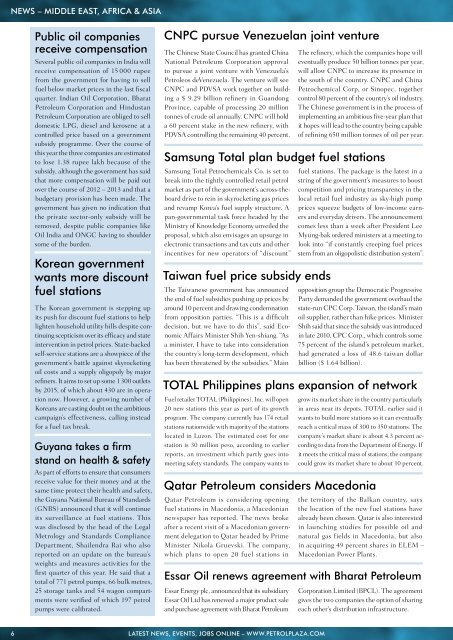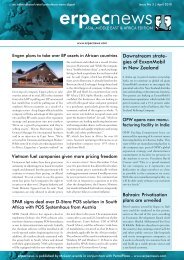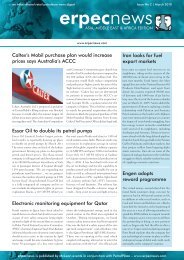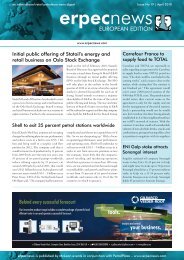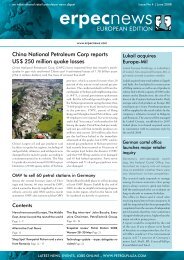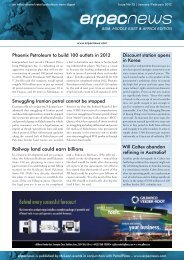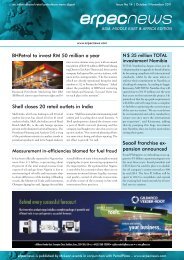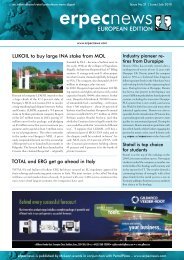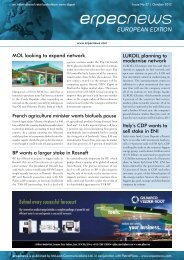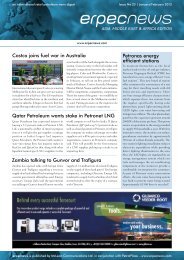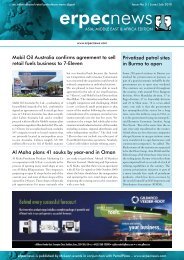Tanzania Oil companies want fuel testing Galp wants ... - ErpecNews
Tanzania Oil companies want fuel testing Galp wants ... - ErpecNews
Tanzania Oil companies want fuel testing Galp wants ... - ErpecNews
Create successful ePaper yourself
Turn your PDF publications into a flip-book with our unique Google optimized e-Paper software.
News – MIddLe eAsT, AFrICA & AsIA<br />
6<br />
Public oil <strong>companies</strong><br />
receive compensation<br />
Several public oil <strong>companies</strong> in India will<br />
receive compensation of 15 000 rupee<br />
from the government for having to sell<br />
<strong>fuel</strong> below market prices in the last fiscal<br />
quarter. Indian <strong>Oil</strong> Corporation, Bharat<br />
Petroleum Corporation and Hindustan<br />
Petroleum Corporation are obliged to sell<br />
domestic LPG, diesel and kerosene at a<br />
controlled price based on a government<br />
subsidy programme. Over the course of<br />
this year the three <strong>companies</strong> are estimated<br />
to lose 1.38 rupee lakh because of the<br />
subsidy, although the government has said<br />
that more compensation will be paid out<br />
over the course of 2012 – 2013 and that a<br />
budgetary provision has been made. The<br />
government has given no indication that<br />
the private sector-only subsidy will be<br />
removed, despite public <strong>companies</strong> like<br />
<strong>Oil</strong> India and ONGC having to shoulder<br />
some of the burden.<br />
Korean government<br />
<strong>want</strong>s more discount<br />
<strong>fuel</strong> stations<br />
The Korean government is stepping up<br />
its push for discount <strong>fuel</strong> stations to help<br />
lighten household utility bills despite continuing<br />
scepticism over its efficacy and state<br />
intervention in petrol prices. State-backed<br />
self-service stations are a showpiece of the<br />
government’s battle against skyrocketing<br />
oil costs and a supply oligopoly by major<br />
refiners. It aims to set up some 1 300 outlets<br />
by 2015, of which about 430 are in operation<br />
now. However, a growing number of<br />
Koreans are casting doubt on the ambitious<br />
campaign’s effectiveness, calling instead<br />
for a <strong>fuel</strong> tax break.<br />
Guyana takes a firm<br />
stand on health & safety<br />
As part of efforts to ensure that consumers<br />
receive value for their money and at the<br />
same time protect their health and safety,<br />
the Guyana National Bureau of Standards<br />
(GNBS) announced that it will continue<br />
its surveillance at <strong>fuel</strong> stations. This<br />
was disclosed by the head of the Legal<br />
Metrology and Standards Compliance<br />
Department, Shailendra Rai who also<br />
reported on an update on the bureau’s<br />
weights and measures activities for the<br />
first quarter of this year. He said that a<br />
total of 771 petrol pumps, 66 bulk metres,<br />
25 storage tanks and 54 wagon compartments<br />
were verified of which 197 petrol<br />
pumps were calibrated.<br />
CNPC pursue venezuelan joint venture<br />
The Chinese State Council has granted China<br />
National Petroleum Corporation approval<br />
to pursue a joint venture with Venezuela’s<br />
Petroleos deVenezuela. The venture will see<br />
CNPC and PDVSA work together on building<br />
a $ 9.29 billion refinery in Guandong<br />
Province, capable of processing 20 million<br />
tonnes of crude oil annually. CNPC will hold<br />
a 60 percent stake in the new refinery, with<br />
PDVSA controlling the remaining 40 percent.<br />
LATesT News, eveNTs, jOBs ONLINe – www.PeTrOLPLAzA.COM<br />
The refinery, which the <strong>companies</strong> hope will<br />
eventually produce 50 billion tonnes per year,<br />
will allow CNPC to increase its presence in<br />
the south of the country. CNPC and China<br />
Petrochemical Corp, or Sinopec, together<br />
control 80 percent of the country’s oil industry.<br />
The Chinese government is in the process of<br />
implementing an ambitious five-year plan that<br />
it hopes will lead to the country being capable<br />
of refining 650 million tonnes of oil per year.<br />
samsung Total plan budget <strong>fuel</strong> stations<br />
Samsung Total Petrochemicals Co. is set to<br />
break into the tightly controlled retail petrol<br />
market as part of the government’s across-theboard<br />
drive to rein in skyrocketing gas prices<br />
and revamp Korea’s <strong>fuel</strong> supply structure. A<br />
pan-governmental task force headed by the<br />
Ministry of Knowledge Economy unveiled the<br />
proposal, which also envisages an upsurge in<br />
electronic transactions and tax cuts and other<br />
incentives for new operators of “discount”<br />
Taiwan <strong>fuel</strong> price subsidy ends<br />
The Taiwanese government has announced<br />
the end of <strong>fuel</strong> subsidies pushing up prices by<br />
around 10 percent and drawing condemnation<br />
from opposition parties. “This is a difficult<br />
decision, but we have to do this”, said Economic<br />
Affairs Minister Shih Yen-shiang. “As<br />
a minister, I have to take into consideration<br />
the country’s long-term development, which<br />
has been threatened by the subsidies.” Main<br />
<strong>fuel</strong> stations. The package is the latest in a<br />
string of the government’s measures to boost<br />
competition and pricing transparency in the<br />
local retail <strong>fuel</strong> industry as sky-high pump<br />
prices squeeze budgets of low-income earners<br />
and everyday drivers. The announcement<br />
comes less than a week after President Lee<br />
Myung-bak ordered ministers at a meeting to<br />
look into “if constantly creeping <strong>fuel</strong> prices<br />
stem from an oligopolistic distribution system”.<br />
opposition group the Democratic Progressive<br />
Party demanded the government overhaul the<br />
state-run CPC Corp. Taiwan, the island’s main<br />
oil supplier, rather than hike prices. Minister<br />
Shih said that since the subsidy was introduced<br />
in late 2010, CPC Corp., which controls some<br />
75 percent of the island’s petroleum market,<br />
had generated a loss of 48.6 taiwan dollar<br />
billion ($ 1.64 billion).<br />
TOTAL Philippines plans expansion of network<br />
Fuel retailer TOTAL (Philippines), Inc. will open<br />
20 new stations this year as part of its growth<br />
program. The company currently has 174 retail<br />
stations nationwide with majority of the stations<br />
located in Luzon. The estimated cost for one<br />
station is 30 million peso, according to earlier<br />
reports, an investment which partly goes into<br />
meeting safety standards. The company <strong>want</strong>s to<br />
grow its market share in the country particularly<br />
in areas near its depots. TOTAL earlier said it<br />
<strong>want</strong>s to build more stations so it can eventually<br />
reach a critical mass of 300 to 350 stations. The<br />
company’s market share is about 4.3 percent according<br />
to data from the Department of Energy. If<br />
it meets the critical mass of stations, the company<br />
could grow its market share to about 10 percent.<br />
Qatar Petroleum considers Macedonia<br />
Qatar Petroleum is considering opening<br />
<strong>fuel</strong> stations in Macedonia, a Macedonian<br />
newspaper has reported. The news broke<br />
after a recent visit of a Macedonian government<br />
delegation to Qatar headed by Prime<br />
Minister Nikola Gruevski. The company,<br />
which plans to open 20 <strong>fuel</strong> stations in<br />
the territory of the Balkan country, says<br />
the location of the new <strong>fuel</strong> stations have<br />
already been chosen. Qatar is also interested<br />
in launching studies for possible oil and<br />
natural gas fields in Macedonia, but also<br />
in acquiring 49 percent shares in ELEM –<br />
Macedonian Power Plants.<br />
essar <strong>Oil</strong> renews agreement with Bharat Petroleum<br />
Essar Energy plc, announced that its subsidiary<br />
Essar <strong>Oil</strong> Ltd has renewed a major product sale<br />
and purchase agreement with Bharat Petroleum<br />
Corporation Limited (BPCL). The agreement<br />
gives the two <strong>companies</strong> the option of sharing<br />
each other's distribution infrastructure.


